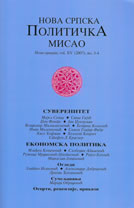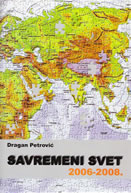| NSPM in English | |||
Europe Doesn’t Matter |
 |
 |
 |
| četvrtak, 11. februar 2010. | |
|
(The National Interest, 10.2.2010)
Europe thought that it had answered Henry Kissinger’s derisive question: what is the phone number for Europe? But the recently approved Lisbon Treaty has only increased confusion as to who speaks for the continent. As a result, President Obama recently announced that he will not attend the upcoming U.S.-European Union summit. If it stands united, Europe could become one of the world’s three or four great powers, along with the U.S., China, and perhaps India. The European Union’s GDP and population both exceed those of America. Many European leaders are desperate to turn Europe into a Weltmacht. For that purpose they concocted the Lisbon Treaty, a complex agreement which created new continent-wide offices, enhanced the authority of the European Parliament, and reduced the power of national governments. Although consolidating power in Brussels and creating a quasi-president and foreign minister are not the same as establishing the United States of Europe, the process was promoted as yielding a more coherent and unified Europe. Irish Senator Deirdre de Burca explained: “If I had to name just one compelling reason to support the Lisbon Treaty, however, it is because the treaty will enhance the capacity of the EU to become a more effective actor at an international level.” Wilfried Martens, a leading Member of the European Parliament, argued that “the EU must be united and able to speak with one voice on the world stage.” Leading Europeans were particularly frustrated that the continent has little geopolitical heft. French President Nicolas Sarkozy contended that “Europe cannot be a dwarf in terms of defense and a giant in economic.” Similarly, opined Charles Grant, director of the Centre for European Reform: “On many of the world’s big security problems, the EU is close to irrelevant. Talk to Russian, Chinese or Indian policy-makers about the EU, and they are often withering. They view it as a trade bloc that had pretensions to power but has failed to realize them because it is divided and badly organized.” True, but most Europeans are far less concerned than their leaders about the continent’s global influence. Polls indicated that in at least half of the EU member states a majority would reject Lisbon if given the chance. Only by denying a vote to everyone other than the Irish—whose constitution required a referendum—was the Eurocratic elite able to force the treaty into effect. Skeptics doubted that Lisbon would deliver its promised benefits, let alone benefits sufficient to warrant sacrificing popular accountability. And so far the EU has achieved nothing to prove the skeptics wrong. After celebrating their treaty victory last fall, European governments chose colorless mediocrities for the new EU offices. A boomlet for former–British Prime Minister Tony Blair as “president,” that is, president of the European Council, fell through. Instead, the EU consensus fell on Belgium’s Herman Van Rompuy, known as much for his penchant for writing haiku as for leading his colleagues. The choice for foreign minister was the even more lackluster Baroness Catherine Ashton, who has never held elective office. Nothing in her performance so far has distinguished her office. In fact, some European governments frankly admitted that they preferred modest consensus builders rather than ambitious global leaders. At the same time, the Europeans have created more bureaucratic chaos. Van Rompuy, as president of the European Council, was supposed to become the political voice of Europe. But the Lisbon Treaty did not dispense with the rotating six-month EU presidency held by governments, currently Spain. There also is a president of the European Commission, Jose Manuel Barroso. So far the latter two have shown little inclination to yield authority to Van Rompuy, Lisbon Treaty or no Lisbon Treaty. Antonio Missiroli of the European Policy Center delicately speaks of “a degree of tension,” especially between Van Rompuy and Spanish Premier Jose Luis Zapatero. Some European analysts more bluntly talk about The Three Idiots. Thus, far from causing Washington to treat Europe with greater respect, the Lisbon Treaty has encouraged the Obama administration to ignore the EU. Before Van Rompuy’s selection, an advocate of Blair’s candidacy observed: “God knows what the Americans would do if we got [a] Belgian as European president. They already can’t be bothered with us most of the time.” Well, the Europeans got a Belgian as president and Washington can’t be bothered by Brussels. The EU actually is losing ground in Washington. Since 1991 the U.S. government has attended, however reluctantly, the transcontinental gatherings. Noted a recent report from the think tank Real Instituto Elcano: “U.S.-EU summits have never been popular with U.S Presidents; in both the Clinton and Bush years they were likened to a dentist’s visit: you knew you had to do it, but it was painful.” Not this administration and this time. The annual EU-U.S. summit was scheduled for May, but the Obama administration recently announced that the president, who visited Europe a half dozen times last year, would not attend. Explained State Department spokesman P.J. Crowley: “Because of the changes involving the establishment of a EU council president and a European commission president on top of the rotating EU presidency, I think it’s taking some time to work through exactly how various high-level meetings will happen.” Nor is it just the U.S. government which is confused. Mongolia’s President Tsakhia Elbegdorj observed after visiting Europe in early February: “I have just been received by the European Council President, I was received yesterday by the President of the European Parliament and after this meeting I will meet the President of the European Council. . . . Er . . . .” The Eurocrats long have emphasized process over substance, with a summit for every problem or presumed problem. Of the planned meeting, said Missiroli, “There was nothing of substance on the agenda, the EU just wanted to hold it for the sake of it.” In fact, it was widely suspected that the Spanish government organized the Madrid-based summit to steal a march on Von Rompuy, who is based in Brussels. “The Three Idiots” fought over the smallest details: Prime Minister Zapatero would get the first handshake with President Obama, while Council President Van Rompuy would sit at the president’s right. The reaction across Europe to Washington’s decision has been a mixture of consternation, frustration and self-pity. After all, George W. Bush was widely reviled across the Continent, but attended every summit. Barack Obama’s election was greeted with euphoria but he has changed U.S. policy little—even escalating the war in Afghanistan. Now the Obama administration seems to be taking the EU even less seriously than did George Bush. Noted the French newspaper Le Monde, “The allies are discovering that the misunderstandings go beyond personalities.” More bitter was the Spanish newspaper El Pais, which charged: “Obama turns his back on Europe.” In fact, though Eurocrats complain that President Obama underestimates the continent’s potential, he well understands Europe’s reality. Apparently the president found last April’s summit in Prague to be a waste of time, so he’s not inclined to risk a repeat. Argued Mats Person of Open Europe: “Until the EU comes up with something actually worth talking about, it’s not surprising that Obama thinks that it’s more important to travel to Asia, South Africa and to attend NATO summits.” That is unlikely any time soon. The Europeans lack policy unity and refuse to devote sufficient resources to back their positions. As a result, the U.S. has no reason to take Europe seriously as a geopolitical force. Even after approving the Lisbon Treaty, the Europeans seem unwilling to do anything practical to support a European foreign policy. EU members are shrinking their militaries and reluctant to deploy troops in dangerous missions. These trends are likely to continue. Europe’s behavior is eminently defensible as representing the interest of Europe’s people. But that means China and Russia, as well as America, have no reason to pay Brussels much mind. India and Brazil lag behind but still seem more serious than the EU. Washington won’t treat Europe as an equal until it acts like an equal. Creating a third EU “president” is no substitute for employing and expanding the tools of international power. But Europe is unlikely to do the latter so long as the Europeans can depend on Washington. And U.S. officials want to preserve that dependence. Philip Gordon, Assistant Secretary of State for Europe and Eurasian Affairs, spoke bluntly in Brussels last September: “We want to see a strong and united Europe, speaking with one voice. In the best of all possible worlds, that one voice will be saying what we want to hear. If it is not saying what we want to hear, then we would rather that voice was less united.” Argued Jose Antonio Alonso, a political ally of the Spanish premier, “I think the U.S. administration is and must be aware of what Europe is.” Unfortunately for the EU, the administration is quite aware of what Europe is. Until Europe, whether through the EU or some other forum, does what is necessary to become a more serious international force, Washington will not take it seriously, irrespective of which member of “The Three Idiots” is at the fore. |
Od istog autora
- France Falls Again
- The End of Nonproliferation
- Riyadh Scores One for Tehran
- Fear and Exhilaration in America
- Conservatives for Empire
- Departing Europe
- Bankrupt Empire
- Ukraine’s Counterrevolution
- A War We Can’t Afford
- Holier Than Thou
- Guns & Butter
- The China Syndrome
- More Friends, More War
- The Russian Hangover
- Playing with fire
Ostali članci u rubrici
- Playing With Fire in Ukraine
- Kosovo as a res extra commercium and the alchemy of colonization
- The Balkans XX years after NATO aggression: the case of the Republic of Srpska – past, present and future
- Iz arhive - Remarks Before the Foreign Affairs Committee of the European Parliament
- Dysfunction in the Balkans - Can the Post-Yugoslav Settlement Survive?
- Serbia’s latest would-be savior is a modernizer, a strongman - or both
- Why the Ukraine Crisis Is the West’s Fault
- The Ghosts of World War I Circle over Ukraine
- Nato's action plan in Ukraine is right out of Dr Strangelove
- Why Yanukovych Said No to Europe

.jpg)








 The EU doesn’t have a united foreign policy and its member countries are downsizing their militaries. Why are Europeans surprised no one pays attention to them?
The EU doesn’t have a united foreign policy and its member countries are downsizing their militaries. Why are Europeans surprised no one pays attention to them?













